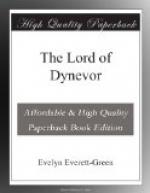“Well, lad, I am glad to see thee looking something more substantial and like thine own self,” said Lord Montacute, seating himself upon the edge of the bed and taking Wendot’s hand in his. “This hand has done good service to me and mine — good service, indeed, to the King of England, who would have been forced to chastise with some severity the outrage planned upon a subject of his, and one dear to him from association with his children. Tell me, boy, what can I do for thee when I tell this tale to my lord of England? What boon hast thou to ask of him or of me? For thou needest not fear; whatever it be it shall be granted.”
“Nay, I have no boon,” answered Wendot, his cheek flushing. “I did but do my duty by any guest beneath my father’s roof. I was responsible for the safety of the maid. I had taken that duty on myself. I want nothing; she is safe, and that is enough. Only if you would speak to my father for my brothers Llewelyn and Howel. I know they have merited deep displeasure; yet they are but lads, and doubtless they were led away by evil counsels. He would hear pleading better from you than from me.”
“It shall be done,” said Lord Montacute, still regarding Wendot steadily; “and now, boy, I would speak to thee seriously and gravely as man to man, for thou hast proved thyself to be a man in action, in courage, and in foresight. And thy parents tell me that thou art acquainted with the burning questions of the day, and that thy brothers’ headstrong hatreds and prejudices do not blind thee.”
Wendot made no reply, but fixed his bright eyes steadily on Lord Montacute’s face. He on his side, after a brief silence, began again in clear, terse phrases:
“Lad, if thou livest thou wilt some day be Lord of Dynevor — master of this fair heritage, the fairest, perhaps, in all South Wales. Thou hast noble blood in thy veins — the blood of princes and kings; thou hast much that men covet to call their own; but thou art surrounded by foes who are jealous of thee, and by kinsmen who have already cast covetous eyes on thy possessions.”
“Ay, that traitorous Meredith ap Res, whose mother is English, and who would — But pardon me. I would not willingly speak against your nation. Indeed, I feel not bitter as others do; only —”
“Boy, thou art right to be loyal and true. I like thee none the less for the patriotic fervour which breaks out in thee. But I am glad that thou shouldest see both sides of this matter, that thou shouldest see the peril menacing thy brothers from thine own kinsman, who has strengthened himself by an English alliance. It is useless to blind thine eyes to what is coming. They tell me thou art not blind; and I come to thee, lad, because I think well of thee, to ask if it would please thee to strengthen thy position in thine own land and in Edward’s sight by an alliance with an English maiden of noble birth. Hast thou ever thought of such a thing?”




